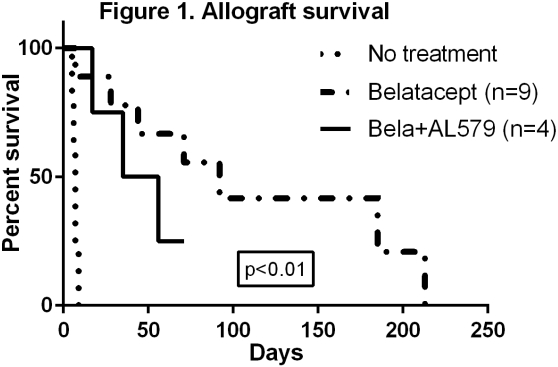Belatacept Immunotherapy Is Not Augmented by Blockade of Activated LFA-1 in a Nonhuman Primate Renal Transplant Model.
1Department of Surgery, Duke University Medical Center, Durham, NC
2Emory University, Atlanta, GA.
Meeting: 2016 American Transplant Congress
Abstract number: B31
Keywords: Adhesion molecules, Co-stimulation, Graft survival, Primates
Session Information
Session Name: Poster Session B: Allograft Rejection, Tolerance, and Xenotransplantation
Session Type: Poster Session
Date: Sunday, June 12, 2016
Session Time: 6:00pm-7:00pm
 Presentation Time: 6:00pm-7:00pm
Presentation Time: 6:00pm-7:00pm
Location: Halls C&D
Purpose: Belatacept specifically targets de novo alloimmune responses without off target side effects. However, resistant alloreactive memory T cells have complicated its use. LFA-1 therapy has been shown to mitigate belatacept resistant rejection in islet transplantation, but at the cost of broad impairment of immune memory. Here we investigate AL579, a monoclonal antibody specific only for the high affinity conformation of LFA-1, to assess its efficacy and safety profile in renal transplantation.
Methods: Rhesus macaques underwent bilateral nephrectomy and MHC mismatched renal allograft transplantation. Control transplants received perioperative steroids with belatacept maintenance therapy, with experimental recipients receiving an additional induction course of AL579. Serial creatinine was used to monitor renal function. Longitudinal flow cytometry of peripheral blood mononuclear cells (PBMCs) was performed after transplantation. Flow cytometry was performed on lymphocytes, splenocytes, and renal graft infiltrating cells (GICs) on rejection, with lymph nodes, spleen, and allograft recovered for histology.
Results:  The addition of AL579 did not improve renal allograft survival compared to belatacept based immunotherapy (Fig 1). Preliminary analysis of longitudinal PBMC phenotyping did not reveal significant differences in T memory subsets or their proliferative markers. Preliminary analysis of GICs do not suggest a different rejection phenotype when analyzing for similar parameters. Immunohistochemical and protective immunity assessments are ongoing.
The addition of AL579 did not improve renal allograft survival compared to belatacept based immunotherapy (Fig 1). Preliminary analysis of longitudinal PBMC phenotyping did not reveal significant differences in T memory subsets or their proliferative markers. Preliminary analysis of GICs do not suggest a different rejection phenotype when analyzing for similar parameters. Immunohistochemical and protective immunity assessments are ongoing.
Conclusions: We find that targeted inhibition of activated LFA-1 did not sufficiently mitigate belatacept resistant immune memory. The redundant effector mechanisms of alloreactive memory T cells likely circumvent highly specific inhibitory agents such as AL579. While longitudinal and endpoint immunophenotyping did not appear to identify a unique profile with AL579 adjuvant therapy, immunohistochemical analysis remains ongoing for a potential vascular adhesion/infiltration phenotype.
CITATION INFORMATION: Samy K, Mulvihill M, Collins B, Lo D, Song M, Leopardi F, Kirk A. Belatacept Immunotherapy Is Not Augmented by Blockade of Activated LFA-1 in a Nonhuman Primate Renal Transplant Model. Am J Transplant. 2016;16 (suppl 3).
To cite this abstract in AMA style:
Samy K, Mulvihill M, Collins B, Lo D, Song M, Leopardi F, Kirk A. Belatacept Immunotherapy Is Not Augmented by Blockade of Activated LFA-1 in a Nonhuman Primate Renal Transplant Model. [abstract]. Am J Transplant. 2016; 16 (suppl 3). https://atcmeetingabstracts.com/abstract/belatacept-immunotherapy-is-not-augmented-by-blockade-of-activated-lfa-1-in-a-nonhuman-primate-renal-transplant-model/. Accessed February 11, 2026.« Back to 2016 American Transplant Congress
